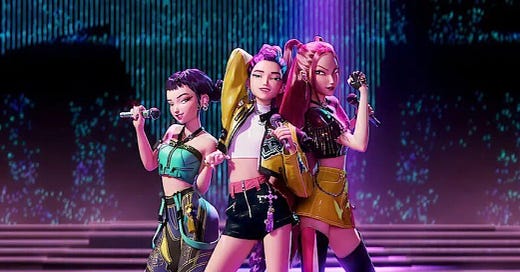Everyone is talking about K-pop Demon Hunters, Netflix’s latest animated action musical. With a 96% on Rotten Tomatoes and its soundtrack beating REAL LIFE K-pop bands, I had to watch it too.
This is not a bad movie. It’s fun and stylish. It’s got killer fight scenes. The soundtrack is catchy. The story compelling. I walked away from the experience a bonafide fan. What it does best isn't what many movies strive for. It doesn't spell everything out. It doesn’t explain every emotional arc or wrap every thread in a bow. What it does is gesture toward something bigger, then it trusts the audience to fill in the blanks.
That’s where format comes in.
K-pop Demon Hunters wouldn’t have worked as a book. The music is central to the experience, a compelling piece of the story telling as the lyrics and song-itself are woven into character arcs. And while books can include lyrics or describe musical moments, most readers find it off-putting when music is too heavily emphasized on the page. Music needs to be heard. In this story, it needs to be felt.
But as a movie, K-pop Demon Hunters almost too tight. With under 100 minutes to spare, it introduces themes like generational trauma, bicultural identity, grief, celebrity, sacrifice, and mythological legacy, but never dives deeply into any of them. There’s no room. The pacing demands momentum over depth.
When you step away at the end of the film, you don’t know terribly much about any of the charactes and yet, that surface-level storytelling might actually be a feature, not a flaw.
Instead of exhausting every emotional detail, the film lets the audience build their own internal headcanon. For example we never find out who Rumi’s father is, but fans have already launched discourse speculating about it, some suggesting the villain, Gwi-ma, could be her father. And how rich and interesting would that make the story if it were true?
Because the film leaves so much unsaid, the viewer becomes part of the world-building. We fill in the emotional blanks with our own experiences and interpretations.
Would a show have worked better? Possibly. A series format would have given the story more time to breathe, more space to explore each character arc, and more room to teach the audience about K-pop and music as a culture. The songs could’ve evolved with the characters. The mythology could have unfolded slowly, deepening our investment.
But maybe the brilliance of K-pop Demon Hunters lies in its restraint. By skimming the surface, it opens the door for broader audience connection. It allows viewers to enter at whatever level feels comfortable. You can enjoy it just for the music and action. Or you can dive into the subtext and start building theories.
In the end, K-pop Demon Hunters is a reminder that format shapes story. Some stories need space to unfold. Others thrive on compression and implication. And when it comes to blending culture, music, and mythology in a way that invites rather than instructs, this movie walks a very fine line, and somehow dances across it.
The lesson I’m walking away with… As a writer, trust the reader. Less might be more.




Excellent take. It’s funny to watch a show and enjoy it and then hear someone else tell you why you liked it and be right.